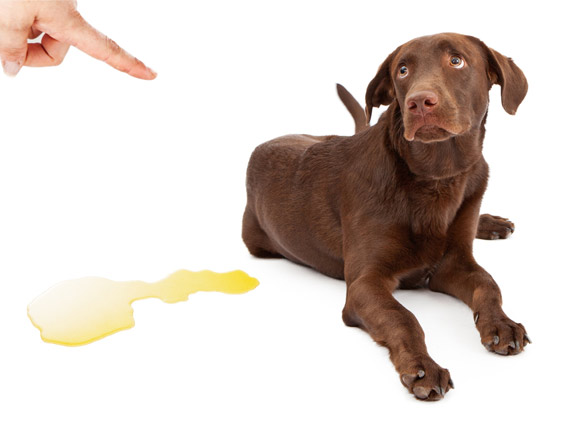

House soiling is a common problem, affecting up to 37 percent of dogs diagnosed with behavioral problems. Most pet owners train their dogs to urinate and defecate outside, and "accidents" usually end while dogs are still puppies, as they learn to wait for scheduled outdoor time. House soiling occurs when a dog regresses to urinating or defecating inside the house. This behavior is more common in male dogs that have not been neutered, although it can occur in non-neutered dogs and cats.
There are two types of house soiling. Behavioral house soiling happens when there is no underlying medical problem causing a dog to go to the bathroom in the house. The other type of house soiling occurs when a health problem is causing a dog to eliminate its body waste inside the house. It may have lost control of the muscles in its bladder or sphincter, or there may be an infection or other condition that is making it difficult for the dog to hold the waste in long enough to get outside. House soiling is the most common reason people give their dogs up to an animal shelter, making this an issue of high importance. The sooner the condition is addressed and resolved, the more likely the family is to keep the dog.
You will need to give a thorough history of your dog's health, onset of symptoms, and possible incidents that might have led to this condition. Your veterinarian will perform a thorough physical exam on your dog, with a complete blood profile, including a chemical blood profile, a complete blood count, and a urinalysis. This will allow your veterinarian to determine whether your dog's internal organs are functioning normally and whether there are any infections of the blood or urinary tract. If necessary, your veterinarian may order other blood tests to check the function of your dog's adrenal and thyroid glands. Fecal (stool) tests may also be ordered to rule out intestinal parasites or digestion problems which might be causing it to defecate in the house.
Your veterinarian may also order x-ray and ultrasound images of your dog's abdomen to look for the presence of kidney or bladder stones, tumors, or other diseases that would affect the internal organs. If no medical cause is found to be causing your dog to urinate or defecate in the house, it will be diagnosed with a behavior problem. If this is the case, your veterinarian may ask you to videotape your dog's behavior, or to keep a diary of when the inappropriate behavior happens.
If your veterinarian has found any underlying medical conditions, they will be treated first. Sometimes, that is all that is needed to resolve the house soiling problem.
If your dog does not have a medical problem causing the house soiling, it may be treated with a combination of medication and training (behavioral modification therapy). Your veterinarian will recommend a training program which will help your dog learn to eliminate its body waste at the right time and in the right place. If your dog is reluctant or is responding with anxiety to the training program, your veterinarian may prescribe anti-anxiety medication, which will help to lower your dog's aversion to the program and encourage it to respond more easily to the training. In some cases, if your dog has not been neutered, your veterinarian may recommend this surgery. This procedure can help up to half of male dogs that urinate in the house to mark their territory.
When first starting a training program with medication, your veterinarian will want to talk with you frequently to make sure that things are going well. If your dog is on medication, follow-up complete blood counts and biochemistry profiles will be needed to make sure the medications are not affecting any of your dog's internal organs. It is important that you give the medications exactly as directed by your veterinarian and that you not change the frequency or amount without first consulting with your veterinarian. Also, make sure that you do not give any other medications at the same time without your veterinarian's approval.
How well your dog responds to the behavioral therapy will depend on how dedicated you are to teaching your dog the new behavior. It is important to be patient with your dog while it is in the learning stage. This can be a slow process. In some cases, it may take several weeks for your dog to start responding to treatment, and several months to achieve full success. Some dogs may need long term medication and training.
Dogs that eliminate in the house because of a medical problem will usually improve once the medical condition has been treated, but in some cases, the house soiling problem may continue after the medial condition is treated.
It is important to start early and be consistent with house training. Early, intensive house training will help your dog to understand where and when it is appropriate to eliminate its waste. Your veterinarian can help you to develop a consistent training program to house train your dog. To prevent territory marking behavior, it is important to spay or neuter your dog as soon as it is old enough. Observing your dog for behavioral and physical changes and acting on them quickly will allow you to resolve the issues quickly, before your dog falls into patterns that require more intensive treatment methods.
Image via Shutterstock
 Diseases of the Skin on the Nose in Dogs
Nasal Dermatoses in Dogs
Many diseases affect the
Diseases of the Skin on the Nose in Dogs
Nasal Dermatoses in Dogs
Many diseases affect the
 Early Death in Puppies
Fading Syndrome (Neonatal Mortality) in Puppies
N
Early Death in Puppies
Fading Syndrome (Neonatal Mortality) in Puppies
N
 Paralysis in Dogs
Loss of Body Movement in Dogs
A dog’s abili
Paralysis in Dogs
Loss of Body Movement in Dogs
A dog’s abili
 Hyperparathyroidism in Dogs
Excessive Levels of Parathyroid Hormone in the Blood in
Hyperparathyroidism in Dogs
Excessive Levels of Parathyroid Hormone in the Blood in
 Yeast Infection and Thrush in Dogs
Candidiasis in Dogs
Candida is a type of su
Yeast Infection and Thrush in Dogs
Candidiasis in Dogs
Candida is a type of su
Copyright © 2005-2016 Pet Information All Rights Reserved
Contact us: www162date@outlook.com